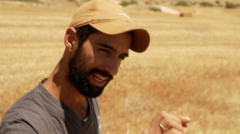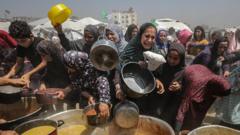The article chronicles a BBC team's unsettling interaction with Moshe Sharvit, an Israeli settler under sanctions for alleged violence against Palestinian communities, as they navigate the complex conflicts in the occupied West Bank.
Tense Confrontation Between BBC Team and Sanctioned Israeli Settler in West Bank

Tense Confrontation Between BBC Team and Sanctioned Israeli Settler in West Bank
A BBC News team encounters Moshe Sharvit, a sanctioned settler accused of aggressive actions toward Palestinians.
Dust rose in the hot midday air as a white jeep approached a team of BBC journalists documenting life in the northern Jordan Valley. "I think it's Moshe Sharvit," remarked Gil Alexander, a 72-year-old Zionist activist advocating for Palestinian shepherds. Sharvit, sanctioned by the UK and EU after accusations of violent intimidation, is a controversial figure in the ongoing Israeli-Palestinian conflict.
Caught in a web of allegations, Sharvit reportedly forced a Palestinian grandmother, Ayesha Shtayyeh, off her family land under duress, claiming divine right over the territory. When confronted by journalists, Sharvit quickly dismissed their presence, branding them as threats to Israel. He even called the police during the encounter, further complicating the dynamics.
Representing contrasting visions of Israel's future, Sharvit aligns with extremist beliefs that endorse complete Jewish sovereignty over the West Bank, while Alexander stands for coexistence and peace, opposing the expansion of settlements. The legality of Sharvit's settlement is contested under both Israeli and international law, creating tensions that resonate through the area.
The situation escalated further as both men have histories of confrontation, including a recent altercation leading to legal consequences for both. During the interview, Sharvit insisted that the fears of local shepherds were fabricated lies, disregarding the historical context of conflict in the region.
Although sanctions against Sharvit have been criticized by Israeli governmental figures, the persistent violence against Palestinians has resulted in increased scrutiny and legal challenges. Reports indicate a troubling rise in settler violence since recent escalations in armed conflict, prompting significant backlash.
As the encounter concluded, Gil Alexander faced questioning by the police and a temporary exclusion order from the Jordan Valley, prompting reflections on the continual cycle of violence affecting both communities. The gravity of the ongoing conflict lingers heavily over the interactions in this contested land.
This clash serves as a profound reminder of the complexities that define Israel and Palestine, embodying both the struggle for human rights and the deeply entrenched divisions that perpetuate the battle over land and identity.
Caught in a web of allegations, Sharvit reportedly forced a Palestinian grandmother, Ayesha Shtayyeh, off her family land under duress, claiming divine right over the territory. When confronted by journalists, Sharvit quickly dismissed their presence, branding them as threats to Israel. He even called the police during the encounter, further complicating the dynamics.
Representing contrasting visions of Israel's future, Sharvit aligns with extremist beliefs that endorse complete Jewish sovereignty over the West Bank, while Alexander stands for coexistence and peace, opposing the expansion of settlements. The legality of Sharvit's settlement is contested under both Israeli and international law, creating tensions that resonate through the area.
The situation escalated further as both men have histories of confrontation, including a recent altercation leading to legal consequences for both. During the interview, Sharvit insisted that the fears of local shepherds were fabricated lies, disregarding the historical context of conflict in the region.
Although sanctions against Sharvit have been criticized by Israeli governmental figures, the persistent violence against Palestinians has resulted in increased scrutiny and legal challenges. Reports indicate a troubling rise in settler violence since recent escalations in armed conflict, prompting significant backlash.
As the encounter concluded, Gil Alexander faced questioning by the police and a temporary exclusion order from the Jordan Valley, prompting reflections on the continual cycle of violence affecting both communities. The gravity of the ongoing conflict lingers heavily over the interactions in this contested land.
This clash serves as a profound reminder of the complexities that define Israel and Palestine, embodying both the struggle for human rights and the deeply entrenched divisions that perpetuate the battle over land and identity.






















